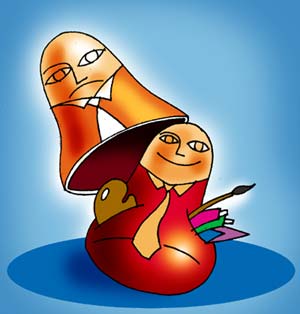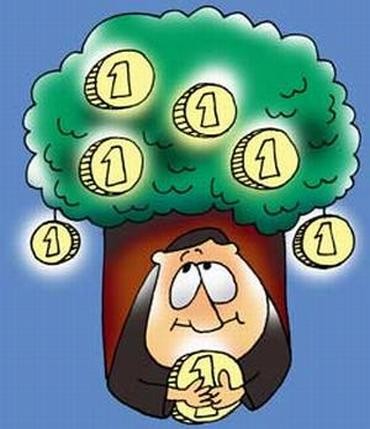 | « Back to article | Print this article |
Crack this case and win Rs 25,000!
The Tata Consultancy Services-Smart Manager Case Contest is the oldest and most prestigious competition of its kind in India.
Apart from a one-year free subscription to The Smart Manager, India's first world-class management magazine, winners from the 'manager' and 'student' categories stand to win cash prises of Rs 25,000 each.
All you have to do is read the case, see the question you have to answer on the last slide, click on The Smart Manager logo below, and post your solutions by October 16, 2011. All the best!
John,
No, this is not a 'Dear John letter', although in the heat of the moment, I might have considered giving you your marching orders, especially as 'obtuse', 'knuckleheaded' -- yes, that's a word -- and 'adamant' went running through my mind as things that always annoyed me about you.
Seriously, though, I have to say that your encouraging Phineas Fogg to write that book and give it to you is dumber than his killing off Bilious Sack. Anyway, that's my personal opinion, and I don't want to get off on the wrong foot.
So let's start at the beginning. First off, no one can deny that the James Hunter series has turned the tide, getting children interested in reading, to an extent, steering them away from computers to books.
Click NEXT to read on . . .
Crack this case and win Rs 25,000!
That's a great achievement. Phineas has a special skill with words, a distinct flair, if you will. And the ability to create life-and-blood characters.
What he hasn't really been able to do is to create a convincing plot. Let me qualify that. Three of the last four books -- you do remember that it was the third book that made him a worldwide phenomenon -- have been a far-too-long bridge to the ever elusive conclusion.
Did you notice too, that even though the sales rocketed, the quality of the story itself spiralled down each and every time she brought out a new addition to the James Hunter series?
Click NEXT to read on . . .
Crack this case and win Rs 25,000!
Books four, five, six are what can be called the tricks of a charlatan at best. Diversionary tactics, thrills and frills leading up to a contrived final resolution in book seven.
Now let me tell you why the series has been popular in spite of all this: plain old-fashioned curiosity. He had gathered a considerable fan following by the time James Hunter and the Jailer of Zenda, the third book, hit the bookstores.
Increasing this loyal base was word-of-mouth appreciation, some of our own publicity, Facebook, whatnot.
Click NEXT to read on . . .
Crack this case and win Rs 25,000!
So he had new readers as well. Which meant that there's a whole bunch of people whose curiosity had been piqued. And which now means that Fogg's sitting on more wealth than Ingots, the bank in his book, can possibly hold.
What he is, I'll grant you, is absolutely astute. There is just enough plot -- the merest hint of a frame -- to keep the stories within the larger context of Hunter's ultimate confrontation with Stormund Drang. This alone has kept Hunter-heads happy.
Fogg has relentlessly exploited the audience's uncertainty -- will the boy live? -- can he possibly take on the world's most powerful bullfighter and win? While this beggars belief, we also know that the sacrifices his family have made for him have got him this far, and we repose our faith in the expectation that it will continue to do so.
Click NEXT to read on . . .
Crack this case and win Rs 25,000!
Some of us also hoped that on the way Hunter might improve his bullfighting skills, but Fogg kept him too busy doing other stuff that we all hoped might help him in some, to us, nebulous way, in the showdown at the end.
Not only this, by 'killing' at least one of their favourite characters in each Hunter edition, Fogg has ensured that his audiences are sitting at the edge of their seats, feeling sorry for a hero with not much skill but a good heart. Brilliant strategy, this.
On an aside though, don't you think this reveals a certain morbid preoccupation on all our parts with Sisyphean tasks?
Click NEXT to read on . . .
Crack this case and win Rs 25,000!
Yes, it was an interesting concept. But somewhere in the middle, he lost direction, but not steam. He certainly huffed, puffed and whistled his way to fame and success.
Fogg's skills lie in his ability to 'borrow' elements from other writers of the genre and make them an integral part of Baranja's landscape.
A good bit of Fogg's success, you'll have to agree, is built around his readers' commitment to the series.
Having invested in about four books, they wanted, needed, to know how it would end. They were compelled, after all the mental and monetary engagement, to see it through to the grand resolution, whatever that may be.
Click NEXT to read on . . .
Crack this case and win Rs 25,000!
Fogg's banked on this, and he's hit pay dirt.
And was there anything 'grand' about the resolution? Carnage, destruction, certainly. But even this doesn't compensate for the tame conclusion that dies not with a bang but with a whimper.
For a story that concludes a seven-part series, there should have been something meatier than this.
His other books have been set around Baranja as well, even if they didn't deal with Hunter and his escapades, and they rode on the success of the series. Boodle the Beard received a somewhat lukewarm reception, although, again, it was marketed brilliantly. Came right on the heels of James Hunter and the Final Reckoning, fed off the buzz around that book, and then they said the proceeds would go to charity.
In short, he has a great publicity team. He is inventive. But that hasn't really been put to test. All his other books are set in the same world of bullfighters.
Click NEXT to read on . . .
Crack this case and win Rs 25,000!
He clearly doesn't need the money, but that really isn't our concern. Granted, there'll be some amount of curiosity, but we can't depend on that alone to generate revenues.
Our overhead costs are bound to shoot up with an author like him, even though he'll add to our prestige. But in the bigger picture, is it worth it to bid for his new manuscript?
It'll be a huge investment. Yes, we've come into a bit of money, but I don't know if it is sound, putting all our eggs literally in one basket. If they hatch, we've got ourselves a brood.
Click NEXT to read on . . .
Crack this case and win Rs 25,000!
But what if our golden goose lays bad eggs? (Don't scold me -- I know I'm mixing my metaphors. But get the point.)
His one achievement is to have boosted the sales of other authors in that genre. Authors, I might add, who are frankly more talented. I say, let's not squander our fortune on netting that manuscript.
Our business has just gotten off the ground. I know I'm not arguing for the safe option, but I feel that we will reap richer rewards if we invest in lesser known, more talented authors who may have a smaller but definite audience; on books we can build a reputation on, not on talent that is dubious, even if terribly well known.
Click NEXT to read on . . .
Crack this case and win Rs 25,000!
I do hope you'll come around to my way of thinking. As you reminded me, you're the one with the authority, and you get to make the decisions.
James
PS: On a personal note, if you do go ahead and get Fogg's manuscript, allow me to tell you that you have no taste at all. None!
And I'll get the cook to start making healthy food to pay you back.
Your questions:
What should be John's business call? Should he go all out and invest in the 'famous' author's new book, which may not be very exciting but may still bring in the readers?
Or should he risk it with new talent and an exciting story?
Click on the logo below to submit your analysis. Or you may want to mail your analysis to casestudy@thesmartmanager.com.
- Your solution and analysis shouldn't exceed 500 words.
- You will be judged on the analysis, clarity of thought, viability, completeness of the solution and language.
- We want plain text: no tables, charts, graphics or any other visuals.
- There is no entry fee for this contest.
- Keep a photo of yourself handy, in case you win.
- For more details, log on to www.thesmartmanager.com or email casestudy@thesmartmanager.com
- Selected to present common managerial dilemmas, the contest case studies are fictitious and have no relevance to any specific company.
- (Note: Please check your email after registration for your username and password).
All right reserved with The Smart Manager









